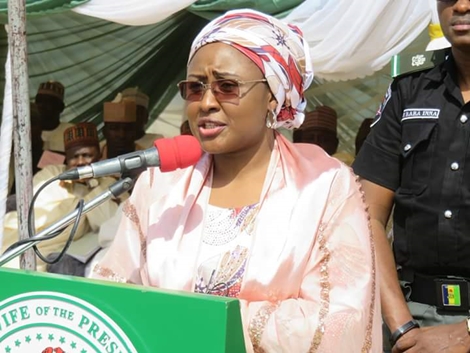
Mrs Aisha Buhari, wife of President Muhammadu Buhari and the National Population Commission (NPC), have called for urgent investment in Africa’s out-of-school teenage girls.
Buhari and the commission, made the call at a side event organised by the Federal Government in collaboration with the UN Population Fund (UNFPA) at the UN headquarters on Wednesday in New York.
The event was part of the on-going 50th session of the UN Commission on Population and Development.
Buhari, whose speech was read by Rep. Asabe Bashir, Deputy Chairperson, House of Representatives Committee on Women in Parliament, said the population of Africa’s out-of-school teenage girls was alarming.
“Out-of-school teenage girls – ages 10 to 19 years – represent almost a quarter of the female population in Sub-Saharan Africa.
“These girls are without opportunities to attend schools or complete their education because of severe economic, social and cultural issues.
“These issues include poverty; early, forced or child marriage; childbearing and motherhood; and lack of access to quality and timely reproductive health care services among others.
“The conditions are particularly worse for those girls caught in the web of insurgency. Thus, they are on the verge of losing the opportunities of achieving their aspirations,’’ Buhari said.
According to her, the event was Nigeria’s means of calling global attention to the three enumerated areas of investment that are prerequisite to realising the girls’ full potential.
The areas of investment are sexual and reproductive health, re-enrolment into formal schools to at least secondary school completion level; and skills acquisition and entrepreneurship.
The wife of the president explained that the event was aimed at presenting different dimensions of the challenges that these out-of-school teenage girls encountered.
“It is also to showcase how a modest investment in their lives can make difference and accrue benefits that are important for realising the future we want in Africa.’
“The future that we want is reaping demographic dividends, achieving sustainable development and relevant Sustainable Development Goals (SDG) to our development aspirations.
“By this, Nigeria welcomes partnerships and collaborations that will support efforts in Africa.
“Such efforts must be tailored towards ensuring that these girls are not left behind as we strive to achieve the SDGs.”
Also speaking, the Chairman, NPC, Mr Eze Duruiheoma, said “if we must reap demographic dividend in Africa, all population segments, particularly those further left behind, must be included.
“The demography in focus – out-of-school teenage girls – constitutes a huge resource for reaping the dividend we seek, which is full implementation of the 2030 agenda.
“The agenda seeks to realise the SDGs, if the right and timely investments are made to address their needs.
“The event is to showcase the far-reaching benefits derivable from investing in the girls’ education – re-enrolment to completion of at least secondary school level’’.
The Director-General of the commission, Mr Ghaji Bello, called for the enforcement of the relevant laws that made provision for ensuring that children are educated to a basic level.
“We have the resources to do that in Nigeria and we have to hold our leaders accountable to the promises they made to the people.
“If our leaders can spend only 10 per cent of the resources on those things which make life meaningful for the masses, there will be great improvements in the lives of the citizens,’’ Bello said.
In his remarks, the Charge D’affaires, Permanent Mission of Nigeria to the UN, Anthony Bosah, regretted the impacts of culture and corruption on the continent and its citizens.
Represented by the Spokesperson for the Mission, Bolaji Akinremi, Bosah said the mission recently sponsored a resolution on “Illicit Financial Flows and Asset Recovery” at the UN.
According to him, this is in tandem with the President Muhammadu Buhari’s anti-corruption agenda.
The theme of the event, attended by African representatives and partners, was: “Investing In Out-of-school Teenage Girls: A Priority for Achieving Demographic Dividend, Sustainable Development and SDGs in Africa’’.







